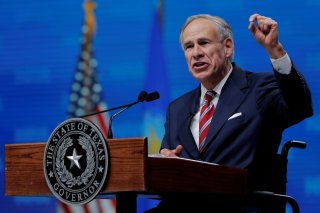One Big State Is Dropping Enhanced Unemployment Benefits June 26
The decision is effective June 26 because federal law requires a 30-day warning for such announcements.
When the American Rescue Plan was passed in March, in addition to $1,400 stimulus checks, the bill extended enhanced unemployment benefits through September, in order to help out those who hadn’t been able to work during the pandemic.
However, the extended unemployment benefits have occasioned something of a backlash, with many business owners claiming they’re having trouble finding people to hire, and federal unemployment figures showing millions of job openings.
And now, one state is ending participation in the unemployment benefits program.
Texas Gov. Greg Abbott (R) announced Monday that the state had informed the Department of Labor that Texas will “opt out of further federal unemployment compensation related to the COVID-19 pandemic.” The decision is effective June 26 because federal law requires a 30-day warning for such announcements.
“The Texas economy is booming and employers are hiring in communities throughout the state,” the governor said in the announcement. “According to the Texas Workforce Commission, the number of job openings in Texas is almost identical to the number of Texans who are receiving unemployment benefits. That assessment does not include the voluminous jobs that typically are not listed, like construction and restaurant jobs. In fact, there are nearly 60 percent more jobs open (and listed) in Texas today than there was in February 2020, the month before the Pandemic hit Texas.”
Abbott also cited “the high level of fraudulent unemployment claims being filed,” citing Texas Workforce Commission figures that “nearly 18 percent of all claims for unemployment benefits during the pandemic are confirmed or suspected to be fraudulent.”
ABC 13 on Monday interviewed some Texans worried about the benefits running out early, as well as one expert who questions the wisdom of Abbott’s move.
“It's incredibly unsurprising a bunch of business owners would like there to not be competition for labor, and they would like to hire people back at relatively low wages,” University of Houston Professor Dietrich Vollrath told the station. “Their other option is to raise wages.”
According to National Law Review, several other states have announced their intention to opt out of enhanced federal unemployment benefits. Those include Alabama, Arizona, Arkansas, Georgia, Idaho, Iowa, Mississippi, Missouri, Montana, North Dakota, Ohio, South Carolina, South Dakota, Tennessee, Utah, and Wyoming. Arizona’s governor has also announced plans to offer a $2,000 “back to work” bonus.
The governor of Oklahoma, per Fox Business, said that because the coronavirus is “no longer an emergency,” the state will opt out of the benefits.
“A few weeks ago, I lifted the state of emergency in Oklahoma because the reality is, COVID’s no longer an emergency in our state,” Gov. Kevin State said. “And . . . we were one of the first states, June 1st, to fully reopen. Cases are down 95 percent. So it is time to end the federal incentive that is incentivizing people to stay at home. And we want to get them back to work in the state of Oklahoma.”
Stephen Silver, a technology writer for the National Interest, is a journalist, essayist and film critic, who is also a contributor to The Philadelphia Inquirer, Philly Voice, Philadelphia Weekly, the Jewish Telegraphic Agency, Living Life Fearless, Backstage magazine, Broad Street Review and Splice Today. The co-founder of the Philadelphia Film Critics Circle, Stephen lives in suburban Philadelphia with his wife and two sons. Follow him on Twitter at @StephenSilver.
Image: Reuters

